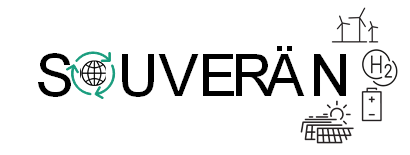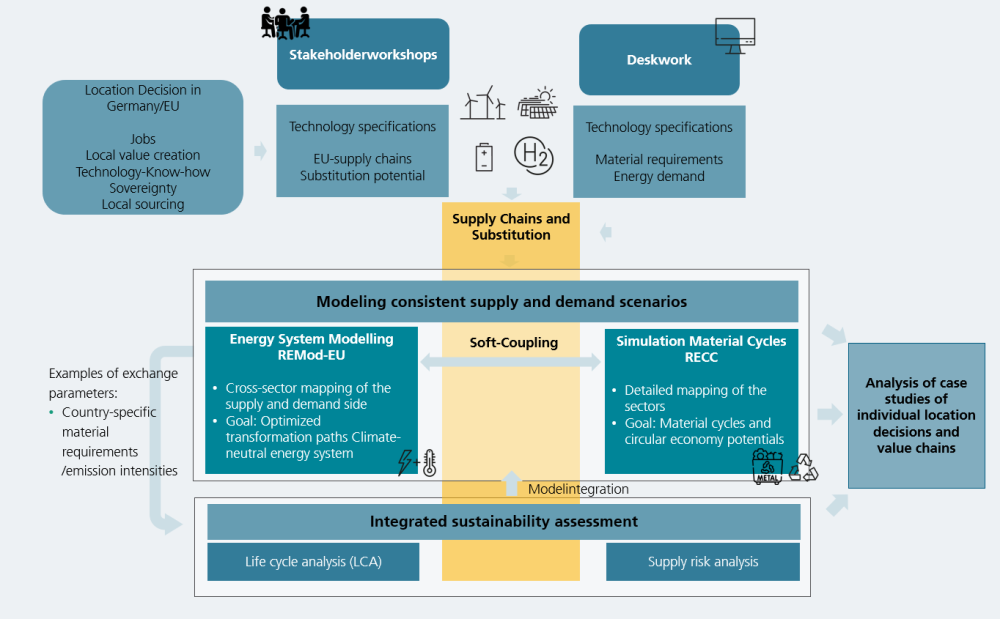| Duration: | 01/2025 - 12/2027 |
| Contracting Authority/ Sponsors: | Federal Ministry of Economic Affairs and Energy (BMWE) |
| Project Partners: | Albert-Ludwigs-Universität Freiburg, Lehrstuhl für nachhaltiges Energie- und Stoffstrommanagement, Universität Bayreuth, Lehrstuhl für ökologische Ressourcentechnologie |
| Project Focus: | |
SOUVERÄN
Sovereign and Sustainable Supply Chains for Key Energy Transition Technologies - Tools and Analyses for On-/Friendshoring, Material Substitution, Resource Efficiency and Circular Economy
The energy transition in the EU is resulting in a potential increase in resource requirements as well as relocation effects of raw material-related emissions abroad. Material efficiency, material substitution and the circular economy are increasingly being supported by political framework conditions, both to reduce the environmental impact of material production and to reduce supply risks in the supply chains. At the same time, the issue of local production and value creation to strengthen technological sovereignty is being given concrete form (e.g. IPCEI battery, EU Solar Energy Strategy, EU Critical Raw Materials Act, National Circular Economy Strategy (NKWS)). However, detailed assessments of the effects of these resource strategies, taking into account the EU objectives in terms of environmental impact, energy requirements, resource requirements, costs of the energy transition and supply chain security and a recommendation on strategies for measures and instruments to leverage potential for sustainable and resource-saving developments are lacking.
The aim of the project is to describe the life cycles and supply chains of key energy transition technologies (photovoltaics, wind power, electrolysis and battery technologies) and develop transformation pathways for the EU's energy system through detailed scientific analyses involving relevant stakeholders from industry and business. The aim is to ensure that the transformation pathways meet multiple sustainability criteria in terms of GHG emissions, circular economy and transformation costs. The four energy technologies photovoltaics (PV), batteries, wind turbines and electrolysis are at the heart of the project. Their value chains are analyzed and modelled in detail. These were selected due to their central role in the energy transition, political relevance and demand for steel, base metals and critical technology metals (e.g. PV: Si, Ag, In - batteries: Li, Ni, Co - wind power: steel, Nd, Dy, Cu - electrolysis: Ir). Technology-specific, production-related and meaningful information and data are to be integrated into the analysis by integrating central associations and industrial sectors within the framework of workshops.
Based on the supply chain and production site analysis, the required resources, materials and energy demands per technology are integrated into an energy system model and a material flow model and transformation paths for the entire energy system are modeled up to 2050. Substitution measures, resource efficiency and circular economy strategies as well as potential EU supply chains (“on-/re-/friendshoring”) are taken into account in order to assess the impact of these strategies on European energy demand, energy-related CO2 emissions and supply risks of raw materials and components. In particular, the results will be used to assess the potential contribution of energy transition technologies to the objectives of the EU Critical Raw Materials Act.
By developing a tool for the location decision of individual production sites in different countries, the results obtained will be broken down to individual company decisions and corporate strategies will be evaluated.

